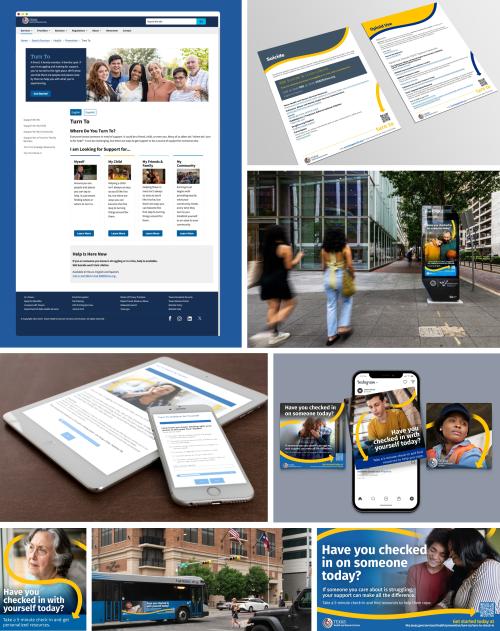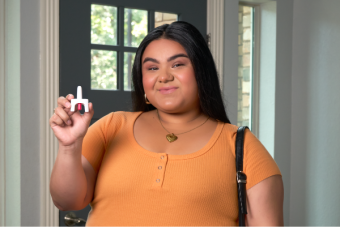"Turn To" Check-In and Statewide Media Campaign
An interactive self-screening tool to promote social connection and healthy ways to manage stress, with the goal of preventing substance use disorder among Texans.

Overview
The Check-In, a component of the statewide "Turn To" campaign, helps users identify potential mental health and substance use challenges and provides customized, evidence-based resources based on users' responses to the self-screening tool. Intended audiences include Texas youth and young adults, parents, and community leaders.
The CHC is funded by the Texas Health and Human Services Commission to promote and evaluate the "Turn To" Check-In and its accompanying resources, with the goals:
- Promoting social connection as a predictor of physical and mental health and substance use
- Providing Texans with resources to manage trauma, stress, anxiety, and other mental health concerns in healthy ways
- Decreasing the effect of stigma on Texans' willingness to seek help for substance use disorder and other mental health concerns
Expertise
- Quantitative research
- Qualitative research
- Creative strategy and testing
- Graphic design
- Campaign evaluation
- Interactive survey design
Timeline

YEAR 1 (2021-2022)
- Conducted formative research and creative testing to inform the "Turn To" campaign, Check-In, and resources
- Conducted environmental scan
- Conducted academic literature reviews
- Led community leader interviews and focus groups
- Developed a formative research survey
- Developed a campaign strategy
- Tested campaign messages and creative designs

YEAR 2 (2022-2023)
- Developed the Check-in tool and resources
- Created Check-in campaign assets and media plan
- Launched the Check-in tool in English and Spanish
- Conducted a campaign evaluation

YEAR 3 (2023-2024)
- Conducted qualitative and quantitative evaluations of the Check-in and resources
- Conducted a campaign evaluation
- Updated the Check-In, resources, and campaign assets based on research results
Approach
Formative research with Texans revealed key strategic insights:
- Participants confirmed links between COVID-19, isolation, mental health challenges, and substance use
- While mental health is discussed more, many Texans identify with "having a tough couple of months" rather than "having a mental illness"
- Stigmatizing language is common, even among community leaders, when discussing substance use disorder (SUD)
- Community leaders are crucial mediators and validators of state health information
Formative research and creative testing shaped the campaign's voice and tone to be:
- Hopeful, trustworthy, supportive, and empowering — balancing the voice of a friend and therapist
- Compassionate — acknowledging mental health is hard to talk about
- Destigmatizing — using person-first, non-judgmental language, and focusing on how mental health challenges affect everyone
- Approachable — replacing unfamiliar or uncomfortable terms (e.g. substance use disorder, depression, or anxiety) with plain, approachable language

Materials

Impact
For this project, success is determined by the number of Check-Ins completed, campaign recall, and various media metrics.
$11.2M
campaign funding
23%
campaign recall among Texans
1,189,423+
ad clicks
69%
campaign viewers who took action
40,387+
check-in completions
Publications

A reasoned action approach to social connection and mental health
Shi, W., Donovan, E., Quaack, K. R., Mackert, M., Shaffer, A. L., De Luca, D. M., Nolan-Cody, H., & Yang, J. (2023). A reasoned action approach to social connection and mental health: Racial group differences and similarities in attitudes, norms, and intentions. Health Communication, 1-8. https://doi.org/10.1080/10410236.2023.2259690

Development and refinement of a communication guide to help young adults in Texas reconnect and reduce loneliness
Donovan, E., Shaffer, A. L., Kaiser, E., Quaack, K. R., Mackert, M., Shi, W., & De Luca, D. M. (2024). Development and refinement of a communication guide to help young adults in Texas reconnect and reduce loneliness. PEC Innovation, 4, 100246. https://doi.org/10.1016/j.pecinn.2023.100246
Related work

Texas Targeted Opioid Response (TTOR)
Tackling the opioid crisis by expanding access to prevention, early intervention, and treatment, along with providing recovery support to Texans with opioid use disorder.

Texas Prescription Monitoring Program
Mitigating opioid risks through effective use of a statewide electronic database that collects and monitors data about controlled substances dispensed in Texas.

Eliminate Tobacco Use Initiative (ETU)
Addressing tobacco use across college and universities and more effectively contributing to actions that create a tobacco-free culture.

